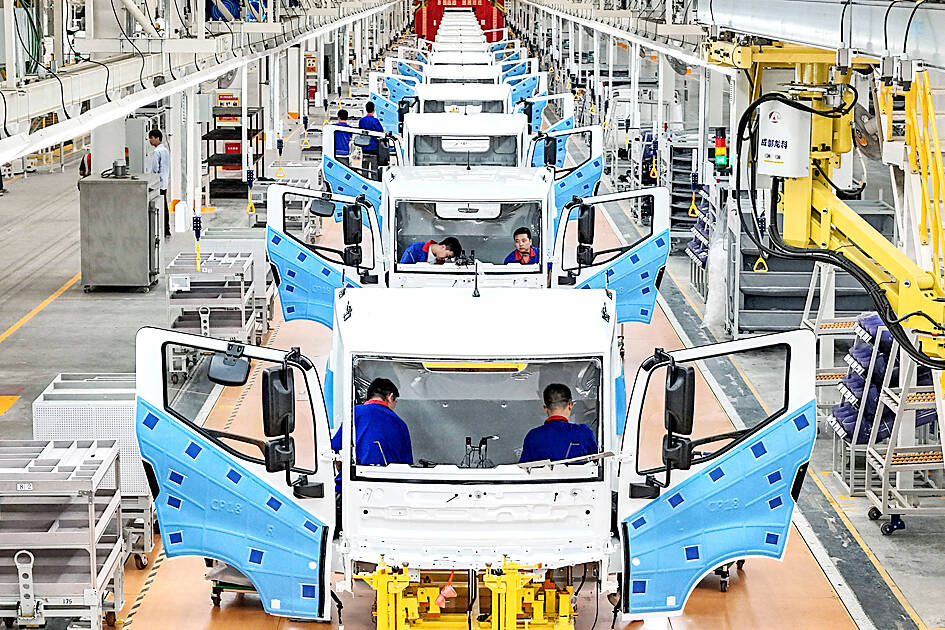Chinese manufacturing contracted for a fourth consecutive month last month, official data showed on Saturday, a worse-than-expected result reflecting the world’s second-largest economy’s struggle to recover.
The purchasing managers’ index — a key barometer of industrial output — stood at 49.1 points last month, China’s National Bureau of Statistics said.
This represents a stronger contraction than in July (49.4 points) for the index, which is based in part on company order books.

Photo: AFP
A figure above 50 indicates an expansion in manufacturing activity, while below that is a contraction.
Analysts surveyed by Bloomberg had anticipated a decline for last month — but a more moderate one of 49.5.
China’s post-pandemic recovery has been brief and less robust than expected.
While some sectors have largely regained their strength — including tourism and the auto industry — others are struggling, particularly real estate, a key growth driver.
In mid-August, China released a series of economic indicators deemed disappointing despite recent government measures aimed at boosting growth.
The nation’s residential slump deepened last month, as expectations of a further drop in new-home prices hampered the country’s efforts to cushion the downturn.
The value of new-home sales from the 100 biggest real estate companies fell about 26.8 percent from a year earlier to 251 billion yuan (US$35.4 billion), more than the 19.7 percent decline in July, according to preliminary data released by China Real Estate Information Corp on Saturday.
The accelerating slide shows the waning impact of the latest rescue package unveiled in May. The sector continues to be a drag on China’s economy, which needs more stimulus to meet the government’s 5 percent growth target this year, Bloomberg Economics said.
China has been considering a new funding option for local governments to buy unsold homes to prop up the market, people familiar with the matter said last month. The latest proposal would allow local governments to fund their home purchases via so-called special bonds, they said.
Cash-strapped developers — many in default for more than a year — are counting on a sales revival to persuade debt holders and fight off liquidation. Dexin China Holdings Co (德信中國控股) in June became the latest builder to be ordered to liquidate by a Hong Kong court, while Country Garden Holdings Co (碧桂園) is considering extending payments on some of its yuan bonds again.

To many, Tatu City on the outskirts of Nairobi looks like a success. The first city entirely built by a private company to be operational in east Africa, with about 25,000 people living and working there, it accounts for about two-thirds of all foreign investment in Kenya. Its low-tax status has attracted more than 100 businesses including Heineken, coffee brand Dormans, and the biggest call-center and cold-chain transport firms in the region. However, to some local politicians, Tatu City has looked more like a target for extortion. A parade of governors have demanded land worth millions of dollars in exchange

An Indonesian animated movie is smashing regional box office records and could be set for wider success as it prepares to open beyond the Southeast Asian archipelago’s silver screens. Jumbo — a film based on the adventures of main character, Don, a large orphaned Indonesian boy facing bullying at school — last month became the highest-grossing Southeast Asian animated film, raking in more than US$8 million. Released at the end of March to coincide with the Eid holidays after the Islamic fasting month of Ramadan, the movie has hit 8 million ticket sales, the third-highest in Indonesian cinema history, Film

BIG BUCKS: Chairman Wei is expected to receive NT$34.12 million on a proposed NT$5 cash dividend plan, while the National Development Fund would get NT$8.27 billion Taiwan Semiconductor Manufacturing Co (TSMC, 台積電), the world’s largest contract chipmaker, yesterday announced that its board of directors approved US$15.25 billion in capital appropriations for long-term expansion to meet growing demand. The funds are to be used for installing advanced technology and packaging capacity, expanding mature and specialty technology, and constructing fabs with facility systems, TSMC said in a statement. The board also approved a proposal to distribute a NT$5 cash dividend per share, based on first-quarter earnings per share of NT$13.94, it said. That surpasses the NT$4.50 dividend for the fourth quarter of last year. TSMC has said that while it is eager

‘IMMENSE SWAY’: The top 50 companies, based on market cap, shape everything from technology to consumer trends, advisory firm Visual Capitalist said Taiwan Semiconductor Manufacturing Co (TSMC, 台積電) was ranked the 10th-most valuable company globally this year, market information advisory firm Visual Capitalist said. TSMC sat on a market cap of about US$915 billion as of Monday last week, making it the 10th-most valuable company in the world and No. 1 in Asia, the publisher said in its “50 Most Valuable Companies in the World” list. Visual Capitalist described TSMC as the world’s largest dedicated semiconductor foundry operator that rolls out chips for major tech names such as US consumer electronics brand Apple Inc, and artificial intelligence (AI) chip designers Nvidia Corp and Advanced